

CommonControls (Replacement of the MS common controls)-VBForums. The Birth of Visual Basic. Visual Basic was conceived when “Ruby” met “Embedded Basic” for the first time in August of 1989.
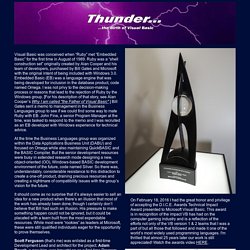
Ruby was a “shell construction set” originally created by Alan Cooper and his team of developers, purchased by Bill Gates and Microsoft with the original intent of being included with Windows 3.0. Embedded Basic (EB) was a language engine that was being developed for inclusion in the database product, code named Omega. I was not privy to the decision-making process or reasons that lead to the rejection of Ruby by the Windows group. [For his description of that story, see Alan Cooper’s Why I am called "the Father of Visual Basic".] Bill Gates sent a memo to management in the Business Languages group to see if we could find some way to mate Ruby with EB. At the time the Business Languages group was organized within the Data Applications Business Unit (DABU) and focused on Omega while also maintaining QuickBASIC and the BASIC Compiler.
Many new controls, properties and events. Microsoft Basic Logical Expression Evaluation. Summary This document describes logical expression evaluation in Microsoft Basic.
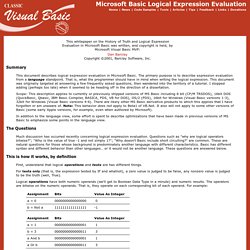
The primary purpose is to describe expression evaluation from a language standpoint. That is, what the programmer should have in mind when writing the logical expression. This document was originally targeted at answering a few frequently asked questions, then wandered into the territory of a tutorial.
GUI (Visual Basic) Data Types (Visual Basic) Functions (Visual Basic) Unsorted (Visual Basic) Text manipulation (Visual Basic) Visual Basic (wikipedia) Visual Basic. Visual Basic. Comparison of programming languages. Programming languages are used for controlling the behavior of a machine (often a computer).
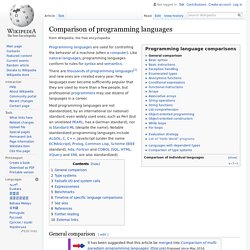
Like natural languages, programming languages conform to rules for syntax and semantics. There are thousands of programming languages[1] and new ones are created every year. Few languages ever become sufficiently popular that they are used by more than a few people, but professional programmers may use dozens of languages in a career. BASIC (Programming Language) DarkBASIC. DarkBASIC is a commercial game creation programming language released by The Game Creators.
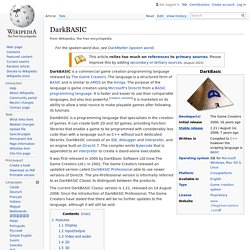
The language is a structured form of BASIC and is similar to AMOS on the Amiga. The purpose of the language is game creation using Microsoft's DirectX from a BASIC programming language. It is faster and easier to use than comparable languages, but also less powerful. Delphi (programming language) Delphi was originally developed by Borland as a rapid application development tool for Windows as the successor of Turbo Pascal.
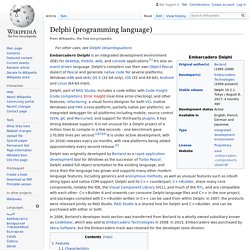
Delphi added full object-orientation to the existing language, and since then the language has grown and supports many other modern language features, including generics and anonymous methods, as well as unusual features such as inbuilt string types and native COM support. Delphi and its C++ counterpart, C++Builder, share many core components, notably the IDE, the Visual Component Library (VCL), and much of the RTL, and are compatible with each other: C++Builder 6 and onwards can consume Delphi-language files and C++ in the one project, and packages compiled with C++Builder written in C++ can be used from within Delphi. In 2007, the products were released jointly as RAD Studio. FreeBASIC. According to its official Web site,[4] freeBASIC provides syntax compatibility with programs originally written in Microsoft QuickBASIC (QB).
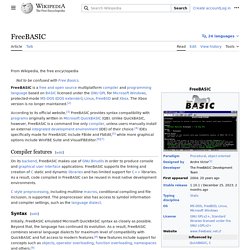
Unlike QuickBASIC, however, freeBASIC is a command line only compiler, unless users manually install an external integrated development environment (IDE) of their choice.[5] IDEs specifically made for freeBASIC include FBide and FbEdit. Compiler features[edit] Syntax[edit] FreeBASIC is not case-sensitive. Graphics library[edit] FreeBASIC provides built-in, QuickBASIC compatible graphics support through FBgfx, which is automatically included into programs that make a call to the SCREEN command.
Users familiar with external graphics utilities such as OpenGL or the Windows API can use them without interfering with the built-in graphics library. PureBasic. PureBasic is a commercially distributed procedural computer programming language and integrated development environment based on BASIC and developed by Fantaisie Software for Windows 32/64-bit, Linux 32/64-bit, and Mac OS X.
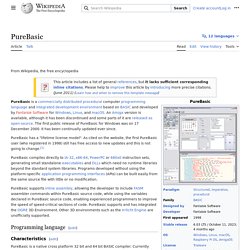
An Amiga version is available, although it has been discontinued and some parts of it are released as open source. The first public release of PureBasic for Windows was on December 17, 2000. It has been continually updated since. PureBasic has a "lifetime license model". As cited on the website, the very first PureBasic user (who registered in 1998) still has free access to new updates and this is not going to change.[1] PureBasic compiles directly to x86, x86-64, PowerPC or 680x0 instruction sets, generating small standalone executables and DLLs which need no runtime libraries beyond the standard system libraries. PowerBuilder. PowerBuilder is an integrated development environment owned by Sybase, a division of SAP.
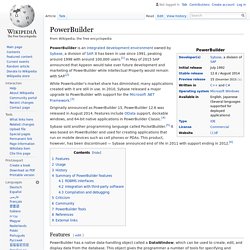
It has been in use since 1991, peaking around 1998 with around 100,000 users.[1] In May of 2015 SAP announced that Appeon would take over future development and marketing of PowerBuilder while Intellectual Property would remain with SAP.[2] While Powerbuilder's market share has diminished, many applications created with it are still in use. In 2010, Sybase released a major upgrade to PowerBuilder with support for the Microsoft .NET Framework.[3] Originally announced as PowerBuilder 15, PowerBuilder 12.6 was released in August 2014.
Features include OData support, dockable windows, and 64-bit native applications in PowerBuilder Classic.[4] PowerBASIC. PowerBASIC is the brand of several commercial compilers by PowerBASIC Inc. that compile a dialect of the BASIC programming language.
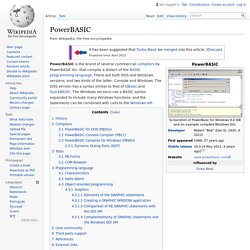
There are both DOS and Windows versions, and two kinds of the latter: Console and Windows. The DOS version has a syntax similar to that of QBasic and QuickBASIC. The Windows versions use a BASIC syntax expanded to include many Windows functions, and the statements can be combined with calls to the Windows API. QuickBASIC. Not to be confused with QBasic.
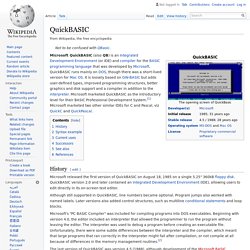
History[edit] Microsoft released the first version of QuickBASIC on August 18, 1985 on a single 5.25" 360kB floppy disk. QuickBASIC version 2.0 and later contained an Integrated Development Environment (IDE), allowing users to edit directly in its on-screen text editor. Microsoft's "PC BASIC Compiler" was included for compiling programs into DOS executables. Beginning with version 4.0, the editor included an interpreter that allowed the programmer to run the program without leaving the editor. A subset of QuickBASIC 4.5, named QBasic, was included with MS-DOS 5 and later versions, replacing the GW-BASIC included with previous versions of MS-DOS. Xojo. Xojo is a programming environment developed and commercially marketed by Xojo, Inc of Austin, Texas for software development targeting Mac OS X, Microsoft Windows, 32-bit x86 Linux, iOS, as well as the web.
Xojo uses a proprietary object-oriented BASIC dialect, also known as Xojo.[1][2] Developers can use Xojo to create applications by using drag-and-drop to build their user interface and then use one programming language to enable the functionality of their application cross platform. History[edit] In 1997 FYI Software, founded by Geoff Perlman, bought CrossBasic,[3][4][5] which had been marketed by its author Andrew Barry[6] as a shareware product. CrossBasic got its name from its ability to compile the same programming code for Mac OS and the Java virtual machine (although the integrated development environment was Mac only). Object Oriented Programming Lanuages. Imparative Programing Languages. Programming Languages. Programming.